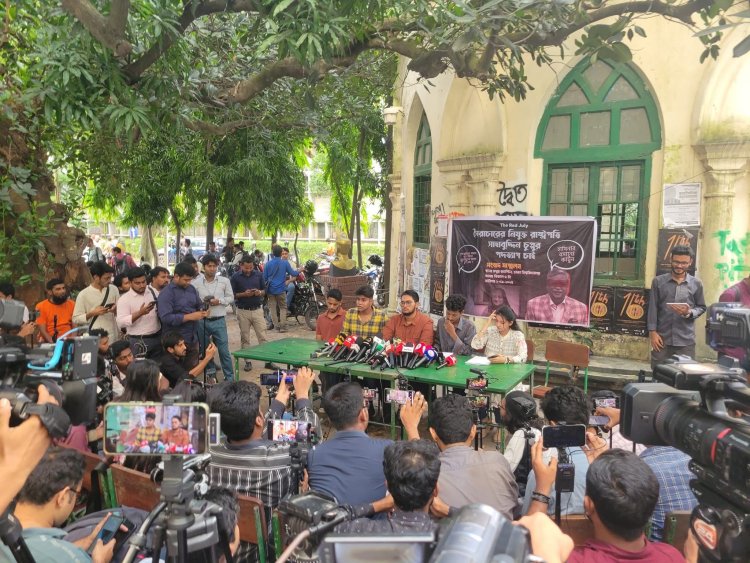Bangladesh Student-Led Mobilisation and the Call for Presidential Resignation
The initiative originates from Dhaka University, historically the centre of democratic and anti-authoritarian movements in Bangladesh. It is being organised under the leadership of Sajib, founding member-secretary of the platform The Red July, together with ordinary students unaffiliated with any political party.

The Power of the People and the Path to a New Constitution
Bangladesh Student-Led Mobilisation and the Call for Presidential Resignation
Dhaka, 02 SEP 2025— In the first week of next month, a major programme is scheduled to take place in Dhaka: a siege of Bangabhaban, the Presidential Palace, demanding the resignation of the illegitimate President (Mohammad Shahabuddin Chuppu).
The initiative originates from Dhaka University, historically the centre of democratic and anti-authoritarian movements in Bangladesh. It is being organised under the leadership of Sajib, founding member-secretary of the platform The Red July, together with ordinary students unaffiliated with any political party.
Observers note that this mobilisation reflects a continuity of Bangladesh’s political history, where Dhaka University students have often been the vanguard of national transformation. From the 1969 uprising against Ayub Khan to the 1990 mass movement that toppled Ershad, Dhaka University has consistently played a pivotal role in moments of political rupture.
The organisers emphasise that this campaign is not tied to any existing political party, but is instead a citizen-driven initiative aimed at accountability and constitutional transformation. Analysts argue that their names, and the actions they spearhead, are likely to be inscribed in the future historical record of Bangladesh’s democratic struggles.
Historical Context
Since its foundation, Dhaka University has been the cradle of anti-dictatorship movements:
In 1969, the student uprising against Ayub Khan.
In 1990, the mass uprising that toppled Ershad.
Today, once again, students and the wider public are demanding the resignation of a President — a former leader of the Awami League’s student wing, who collaborated with Sheikh Hasina and, as head of the armed forces in July–August 2024, was directly complicit in atrocities. His resignation and trial before the people’s court are inevitable.
Abolishing the Constitution and Creating a New One
Many argue that “the Constitution cannot be abolished without Parliament.” But both history and law tell us otherwise.
1. Constitutional Deadlock
Under Article 142 of the Constitution of Bangladesh, amendments require a two-thirds majority in Parliament. But if:
the Prime Minister has fled following a mass uprising,
Parliament has been dissolved,
and the President is implicated in mass killings and treason,
then the constitutional framework becomes defunct in practice. The only path forward is “extra-constitutional but legitimate” action — a course repeatedly taken throughout history.
2. People’s Referendum and New Constitution
Bangladesh’s Constitution does not provide for referenda. However, in revolutionary circumstances, an interim government formed by popular mandate may organise a referendum to legitimise a new Constitution. Legitimacy would arise from:
Popular sovereignty (the will of the people), and
De facto authority (effective control of the state).
3. International and Historical Precedents
Bangladesh (1972): Pakistan’s Constitution was abandoned; a new Constitution was drafted based on the reality of independence.
Nepal (2006–2008): After the monarchy’s fall, an interim constitution and new constituent assembly were created.
South Africa (1990–1996): Following the end of apartheid, an interim constitution was followed by a democratic one.
France (1793, 1848, 1958): New constitutions were born during revolutionary upheavals.
4. The Bangladeshi Reality
Given the collapse of state structures:
An interim government under popular leadership,
The declaration of an interim constitution,
Formation of a constituent assembly,
And, if necessary, a referendum —
constitute the only legitimate way forward.
The State, Corruption and People’s Rights
Bureaucracy and administration have long been corrupted. Millions of taka are exchanged for transfers and promotions, costs ultimately borne by the public through taxes and market prices.
But what has the state given back to its people?
In Bhutan, healthcare and medicines are completely free.
In Bangladesh, even drivers within the Ministry of Health have amassed hundreds of crores of taka.
Every day, billions are stolen. If this system is not overturned, then after Hasina, another figure will exploit it in the same way.
The People’s Struggle
Those who could not join the Ganabhaban siege must take part in the Bangabhaban siege. This is the duty of a true patriot. It is the people’s responsibility to ensure that their children grow up in a safe Bangladesh, enjoying fundamental rights.
To the political parties: do not attempt to mislead the people. A mass uprising cannot be prevented.
A king who robs his people is no king. Just as a lion never eats grass, the people will never accept deception.
My Commitment
I have dedicated 17 years of my life to party and country. Even in political exile, I continue researching constitutional law so that every citizen may enjoy equal rights.
I issue this challenge: those who seek false credit or betray the people, will be resisted. The era of distorting history is over.
Call to Action
I call upon retired military officers and qualified professionals at home and abroad: let us together build a self-reliant, corruption-free, and secure Bangladesh.
Bangladesh Zindabad.
✍️ 03 September 2025
Raju Ahmed Dipu
(2nd Spokesperson, Bangladesh Uprising 2021–2024)
Political Exile, Germany | Country Analyst | Specialist in International Business Law
Email: dipu@countrypolicy.com










